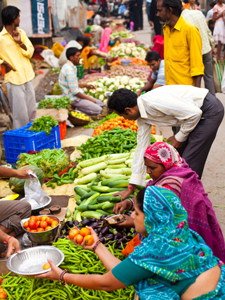U.S. and India student teams compete to launch environmental social ventures

CSE civil engineering students among the University of Minnesota's finalist teams
Contacts: Mary Hoff, Institute on the Environment, maryhoff@umn.edu, (612) 626-2670
Jeff Falk, University News Service, jfalk@umn.edu, (612) 626-1720
MINNEAPOLIS / ST. PAUL (01/31/2012)—Twelve international teams of student entrepreneurs, including three teams from the University of Minnesota with several civil engineering students, will present business plans for initiatives that address global societal challenges in India at the Acara Challenge Finals Feb. 2 and 3 in St. Paul and India.
Acara, a program of the University of Minnesota’s Institute on the Environment, will award up to eight scholarships to the Acara Summer Institute in Bangalore, India, where winners can continue work on ventures they developed over fall semester. Acara Fall 2011 Challenge focuses on creating businesses that improve food security and/or the environment in India.
The St. Paul–based competition finals event is from 8 a.m. to 6:30 p.m. Feb. 3 at CoCo, 213 4th St. E., and is open to the public. Five teams of U.S. and Indian students, selected previously from a field of more than 20 teams, will present to a panel of judges from 8 to 11:30 a.m. Three of the five finalist teams include students from the University of Minnesota’s College of Science and Engineering, College of Design and Humphrey School of Public Affairs.
College of Science and Engineering students who are members of the University of Minnesota teams include: civil engineering graduate student Eric Svingen, civil engineering seniors Amine Dahab and Kuo-Dahab Camilla, and materials science junior Kathryn Klarich from Team Blue Food; civil engineering graduate student K. Brook Jacobson and civil engineering senior Kristin Anderson from Team Food Miles; and civil engineering graduate student Alex Schmidt and civil engineering seniors Anne Haws and Charles Butterworth from Team Rot2Roti.
After judges provide individual feedback to teams, an open house with appetizers and poster presentations from all the teams is planned from 5 to 6:30 p.m. A session from 6:30 to 7:30 p.m. will feature three-minute pitches from the competing teams, a talk from Ashoka fellow and World Savvy founder Dana Mortenson, and award presentations. The morning presentations and evening poster session and presentations are open to the public. The morning presentation will also be webcast live at https://umconnect.umn.edu/acara_webinar.
Presentations by teams from India will be made online on Thursday, Feb. 2; the URL is available upon request. “Our students are really motivated to take on big global problems,” said Fred Rose, co-director of the Acara Institute. “The Acara Challenge gives them the tools to address those problems on a local level by creating businesses suited to specific markets. I’m quite impressed by what they have come up with, and I believe that they have the passion and skills to make a real difference.”
U.S.-India teams and their projects:
BlueFood (University of Minnesota, TERI University in India) – providing consulting and marketing services to street food vendors in Delhi communities to improve the safety of street food for consumers.
Easy Rasoi (Cornell University, Somaiya Institute of Management Science & Research (SIMSR), India) – providing fresh-cut vegetables, recipes and ingredients to young professionals.
Food Miles (TERI University, U of M) – mitigating the effects of food on the wallets of New Delhi consumers while increasing the income of farmers in the region through a produce-delivery service.
Renew Waste Compactor Service (University of Cincinnati and IIT Roorkee, India) – providing an efficient, profitable way to collect waste while providing income to community members.
Rot2Roti (U of M, TERI University in India) – In Delhi, converting compost waste from the Azadpur Mandi market into fuel for the adjacent Shalimar Slum.
Ujjwal (Cornell University and SIMSR) – addressing the gap in prenatal care knowledge and guidance among pregnant women in Mumbai, India.
India-only teams and their projects:
Aahar (Tata Institute of Social Sciences (TISS) – improving the condition of landless, marginalized poor in Odisha by allowing them to farm on leased land.
Anvita (TISS) – developing low-priced splints and distributing them in Tier II and Tier III cities in India to address disability due to amputation, paralysis or deformity.
Green Caps (Vellore Institute of Technology) – developing biodegradable lids for plastic water bottles.
Dharohar (Xavier Labour Research Institute) – providing producer groups and artisan clusters in Jharkhand with marketing linkages and training modules to enhance their skills.
Nirmal (Xavier Institute of Management (XIMB)) – purifying water and removing excess iron content from drinking water.
Vidyut (XIMB) – for post-harvest processing of chilies and turmeric, increasing processing speed and efficiency and reducing wastage.
In addition to the competing schools, a nonprofit organization that participated in a January term class for U of M students interested in starting a social venture also will present its business plan. Eat for Equity (E4E), which organizes monthly benefit dinners to raise money for good causes, will bring its community-driven model to cities across the country.
Acara is a program of the University of Minnesota’s Institute on the Environment that prepares young leaders to take on the environmental grand challenges facing the world. The program's annual Acara Challenge teaches international teams of students how to develop entrepreneurial solutions to specific sustainable development challenges, then helps the best teams launch their ventures.
For more information go to environment.umn.edu/acara.
